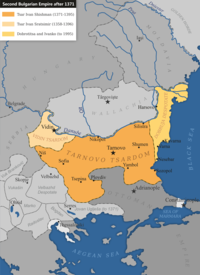Ivan Sratsimir or Ivan Stratsimir (Bulgarian: Иван Срацимир) was emperor (tsar) of Bulgaria in Vidin from 1356 to 1397. He was born c. 1324 or 1325, and he died in or after 1397.
Life
Ivan Sratsimir was born in Lovech c. 1324–1325 as the second son of Ivan Alexander and his first wife Theodora of Wallachia. His maternal grandfather was Basarab I of Wallachia. He was given the name of his paternal grandfather, the despotēs Stratsimir of Krăn. In 1337, together with his younger brother Ivan Asen IV, Ivan Sratsimir was associated as co-emperor by their father Ivan Alexander. At this or some later point, Ivan Sratsimir was based in Vidin, which remained his capital for the rest of his reign.
In the 1340s Ivan Sratsimir's positions within the family may have advanced, as he married and had children (though the names of his wife and children are unknown), while his older brother Michael Asen IV apparently remained childless, and his younger brother Ivan Asen IV had only two daughters. The deaths of Ivan Asen IV and Michael Asen IV in battles against the Ottoman Turks in 1349 and 1354–1355 left Ivan Sratsimir as the only heir of Ivan Alexander by his first marriage.
However, Ivan Alexander had married again, to a second Theodora (Sarah before her conversion to Orthodoxy), a Jewess from Tărnovo. This marriage produced at least two sons, and in about 1356 Ivan Alexander crowned the elder of these, Ivan Shishman (Ivan Šišman) co-emperor. This action appears to have seriously tested the relations between father and son, and from this point Ivan Sratsimir ruled Vidin with effective autonomy, while Ivan Alexander made no ostensible effort to curb his independence.

Second Bulgarian Empire after 1371.

Image of Ivan Sratsimir from a contemporary Bulgarian translation of the Manasses Chronicle.
Ivan Sratsimir continued the family alliance with the princes of Wallachia by marrying as his second wife his cousin, Anna, a daughter of prince Nicolae Alexandru of Wallachia. In 1365 Ivan Sratsimir was suddenly attacked by the Hungarian King Louis I of Anjou, who captured Vidin after a month-long siege. Ivan Sratsimir and his family remained Hungarian captives for four years and lived in the fortress of Humnik in Croatia. During his captivity, Ivan Sratsimir was forced to abjure Orthodoxy and to become a Catholic.
In 1369, using a hefty monetary payoff and territorial concessions, Ivan Alexander undertook the reconquest of Vidin, which was effected by Vladislav I of Wallachia and Dobrotitsa (Dobrotica) of Dobrudža. Ivan Sratsimir was restored to his throne, but he had to acknowledge effective Hungarian overlordship. After Ivan Alexander died in early 1371, the connection between Vidin and Tărnovo was effectively severed, although Ivan Sratsimir and Ivan Shishman did not engage in the fratricidal struggle sometimes ascribed to them. On the contrary, the charter of Ivan Shishman to the Rila monastery named his half-brother Ivan Sratsimir as a potential heir. Nevertheless, Ivan Sratsimir was determined to ostensibly assert his independent status, and in 1381 he placed the metropolitan archbishop of Vidin under the control of the Patriarch of Constantinople.
After the Ottoman invasion of northern Bulgaria in 1388, Ivan Sratsimir was forced to acknowledge Ottoman overlordship and accept Ottoman garrisons in his land. After the fall of Tărnovo in 1393 and the death of Ivan Shishman in 1395, Ivan Sratsimir may have attempted to exert either his secular authority or the religious authority of his metropolitan archbishop over at least part of his brother's former realm. This tentative succeeded in little more than transferring the relics of Saint Filoteja from Tărnovo to Vidin.
Disappointed, Ivan Sratsimir may have already come to an arrangement with the anti-Ottoman Crusade led by the Hungarian king Sigismund of Luxemburg. The crusade materialized in 1396 and Ivan Sratsimir and his subjects readily aligned themselves with the crusaders, and placed their resources at their disposal. The crusade ended in disaster at the battle of Nikopol on 25 September 1396. Ivan Sratsimir spent the next year in uncertainty, but by the end of 1397 Sultan Bayezid I approached Vidin and, assured by the promise of his safety, Ivan Sratsimir came out to meet him. On the order of Bayezid I, Ivan Sratsimir was arrested and conveyed to Bursa, while the Sultan confiscated the contents of the Vidin treasury.
The fate of Ivan Sratsimir is unknown. While it is generally assumed that Vidin was annexed by the Ottoman Empire in 1397, at least part of the realm remained under the control of his son and heir Constantine II.
Sratsimir Hill on Trinity Peninsula in Antarctica is named after Ivan Sratsimir of Bulgaria.
Family
Nothing is known about Ivan Stratsimir's first wife and children apart from their existence. Ivan Sratsimir married as his second wife his first cousin, Anne of Wallachia, daughter of his uncle Nicholas Alexander of Wallachia, and had at least three children:
- Dorothea (Doroslava), who married King Tvrtko I of Bosnia and became Queen of Bosnia.
- a daughter, who died young at the court of Elisabeth of Poland
- Constantine II, who succeeded as Emperor of Bulgaria 1397–1422.